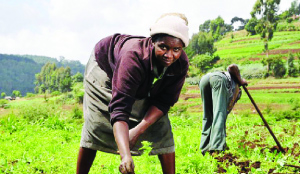By JOWIT SALUSEKI –
AFRICA’s agricultural image is normally associated with small-scale, hand hoe, rain-fed, poor seed varieties and inaccessibility to markets.
Small-scale farmers on the continent continue to face many hardships despite the huge amount of energy and resources invested into their farming activities.
This has been partly due to geographical location with many smallholder farmers being located on land that is prone to a risk of calamities such as increased environments which have been subjected to degradation, increased floods and rural areas that are hardly accessible.
Agricultural activities in Africa have been going on since time immemorial but it has now been realised that productivity is declining while poverty levels and food insecurity are rising.
In the recent past many African governments, including Zambia, have introduced input subsidies but this has destroyed the soil as the organic content diminishes from the soil.
Many farmers have no means to rejuvenate the soil which has lost its nutritive value and water holding capacity.
This is what leads to insufficient food and malnutrition.
On the other hand, with some people adopting Western lifestyles, the consumption and preservation of traditional foods remain a challenge.
Thus the Participatory Ecological Land Use Management (PELUM) recently organised a symposium for small-scale farmers in Lusaka to brainstorm on ways in which the preservation of indigenous foods can be revived.
Speaking during the symposium, Rural Small Scale Farmers chairperson Dorcas Onyango said that since time in memorial farmers had been producing food using recycled seeds that resisted the harsh conditions, pests and diseases but had of late been advised to grow hybrid seeds.
“As small-scale farmers, we are advised to leave traditional seeds for hybrid seeds which require chemical fertilisers and pesticides…We are, therefore, begging the Government to seriously reconsider this so as to preserve our foods, which is our identity,” Ms Onyango said.
PELUM chairperson Charles Nyakora called upon the State to critically look into developing small-scale farmers support policies because family farming was the cornerstone of sustainable rural development.
PELUM comprises 258 civil society organisations working on sustainable rural development in Kenya, Uganda, Rwanda, Botswana, Malawi, South Africa, Lesotho, Ethiopia, Zimbabwe and Zambia.
Senior Chieftainess Nkomeshya bemoaned that small-scale farmers were being evicted from their land in preference for investors, thereby disadvantaging them from having access to farming land.
She called for an end to land grabbing, saying that traditional leaders were the custodians of family farming.
The traditional leader strongly demanded for the citizenry to revert to African foods and shun Genetically Modified Organisms (GMOs).
She urged African governments to desist from being held hostage by multinational organisations that wanted to impose their ideologies on local farmers.
Chieftainess Nkomeshya said that traditional farmers were the foundation and base of small-scale farming.
Vice-President Inonge Wina said the Government recognised the importance that agriculture played in the livelihoods of the Zambian population.
Ms Wina said since 80 per cent of the people were directly or indirectly involved in agriculture, the Government was committed to the development of the sector to reduce poverty.
Ms Wina said that most small-scale farmers faced a number of challenges ranging from low productivity to access to finances and climate change.
“A number of countries in the region lack key agricultural infrastructure such as roads, warehouses, irrigation systems, high transport costs, lack of storage facilities and unreliable water supplies, all of which conspire to limit agricultural yields and access to food,” Ms Wina said.
The Vice-President observed that in as much as governments in the region were making concerted efforts in uplifting the welfare of small-scale farmers, there was need to develop partnerships with stakeholders in the sector.
Ms Wina said it was high time the image that portrayed the African smallholder farmers as being peasant and subsistence was discarded.
According to the Food and Agriculture Organisation report, agricultural production will have to increase by 60 per cent by the year 2050 to satisfy the expected demand for food to feed additional two billion people anticipated to be living in developing countries.







